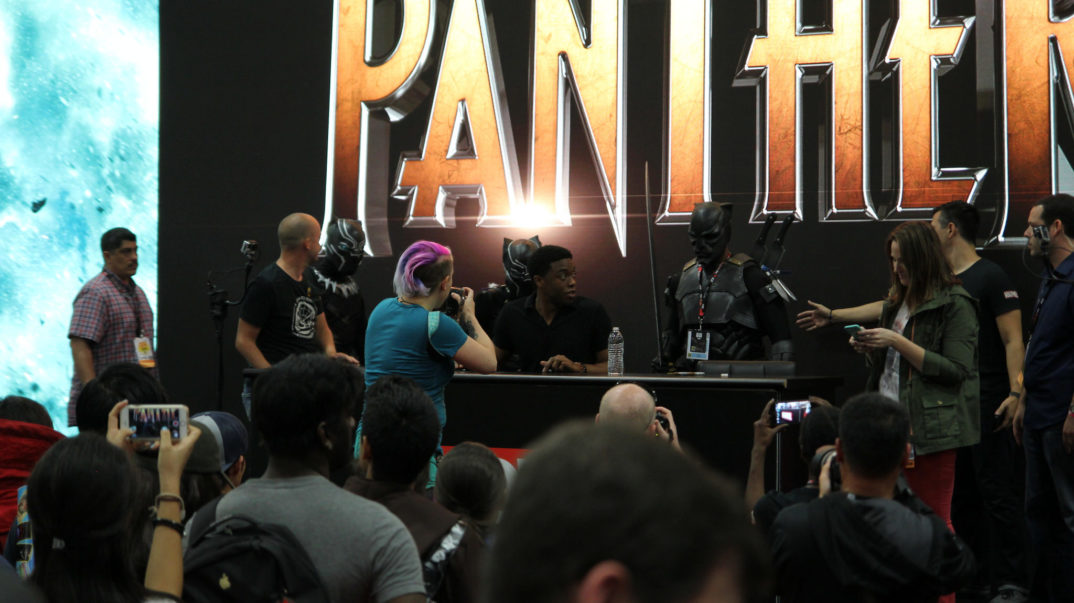All Hail the King
In 1966, comic creators Stan Lee and Jack Kirby introduced a new character in issue #52 of the Fantastic Four. It all started when Reed Richards, Mr. Fantastic, (the guy who stretches, for those who don’t know) was gifted with a high-tech space craft from a mysterious “African chieftan” and was invited to meet him. Mr. Fantastic and the rest of the Fantastic Four obliged and visited this mysterious African chieftan, only to discover that his true identity was T’Challa, king of an advanced country called Wakanda and possessor of the mantle of the Black Panther.
Since Black Panther’s debut in 1966, the Wakandan king has starred in his own series of comic book titles and has become a key factor in the cohesion of the Marvel comic book universe. Now, over 50 years later, Black Panther takes his place in the Marvel Cinematic Universe among Iron Man, Captain America, and Spider-Man in his first standalone movie of the same name that releases in theaters this week. Black Panther the film is already an iconic production in itself due to a predominantly black cast, but other elements in the film could be an indicator of something greater. With that said, will Black Panther revolutionize the way that black people are portrayed in film?
Since humans figured out how to project moving images onto a screen and craft storylines to go with them, black people have been disenfranchised. In fact, the disenfranchisement of black people was in full effect prior to the creation of film with the popularity of minstrel shows. Since the creation of minstrelsy in the 1830’s, black people were misrepresented as white actors who danced around stage in blackface, creating outrageous personas that they believed black people possessed. Once film was established, racist projects such as Birth of a Nation emerged, a manifestation of the desires of a portion of the white population to return to the pre-Civil War era. In Birth of a Nation, once again, white actors dressed in blackface, adopting subhuman personas that required them to chase white women.
The images shown in films such as Birth of a Nation established a trend of black characters being portrayed as inferior. For instance, from the 1930’s to the 1960’s, racist cartoons in blackface were shown to audiences. These cartoons gave rise to the caricatures that were not only common in these cartoons, but falsely attributed to black people in real life. For instance, there was the “sambo” caricature, which depicted a usually older black man who was lazy, incompetent, and loved to dance. As time progressed, racist images depicting black people were not as prominent, but still ever present with the establishment of blaxploitation films and other programs of the sort. Now, though black people in film and television aren’t so much faced with the issue of racist images, they still face the issue of representation. Token black characters are abundant across film and television dramas. With no love interest or any cohesive backstory, black people often act as sidekicks in films, with their sole purpose being to assist the white protagonist.
But Black Panther casts off all inferior roles for black people. With a predominantly black cast, the film demonstrates that black people have more purpose than assisting white protagonists. In the film, T’Challa also has a love interest, disrupting a long running trend of black people not being romanticized in mainstream films. As King of Wakanda, a country housing a rare and coveted metal called Vibranium in the Marvel Universe, T’Challa stands as an individual whose wealth surpasses that of Iron Man and whose intellect rivals that of Reed Richards, who is seen as one of the smartest men in the Marvel Universe. This film has a chance to make an impact and possibly encourage films where black people are not seen as the token.
Of course, Black Panther is not the first film to change the role of black people in film. Recent films such as Get Out, Moonlight, and Hidden Figures make black actors the main focus of a story. Perhaps more relevant to the superhero genre, the Justice League film, a culminating event in the DC Cinematic Universe, introduced Cyborg, a half-man half-machine that can not only tap into the worldwide web with a thought, but also shoots lasers out of his hand that can morph into a cannon. Although in Justice League Cyborg is slightly overshadowed by the presence of DC’s hallmark characters (Superman, Batman, and Wonder Woman), he has a pivotal role in the film and is slated for a solo film in the future. Perhaps by focusing on a person of color, the Cyborg movie will have a similar impact to that of the Black Panther film, and better represent people of color on the big screen.
There is absolutely no doubt that Black Panther will make an impact on audiences. The film has generated a lot of buzz and will most likely be a box-office smash, with a projected earning of $140-150 million in the opening weekend. The racial implications that Black Panther proposes can’t guarantee that the film will revolutionize the way that black people are depicted in film and television. Most likely, films and television shows will continue to come out that feature black people in secondary roles. But perhaps Black Panther is just the beginning. The film might just act as a catalyst that will slowly mold how the film industry is run. Perhaps in the future, there will be a majority of black actors at the helm of mainstream films rather than their whites counterparts. Or maybe film formulas will be devised that star both people of color and white actors. Either way, it is amazing to see how black people have transitioned from racist and damaging portrayals to ones of royalty.





